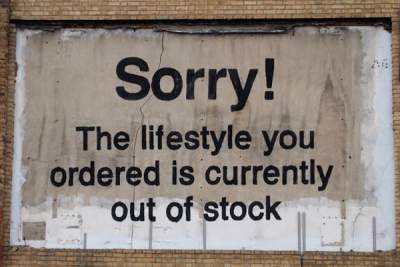Image by Banksy
It’s always an exciting and mind expanding experience to get a library card, and spend at least 25 years studying environmental history and ecological sustainability, while also developing a loving intimate relationship with the ecosystem around you. There’s something healthy, intelligent, and sane about being present in reality, including its tremendous and worsening dark side. Year after year, the more you learn and heal, the less at home you feel in this culture, which has little interest in the wellbeing of the family of life.
Becoming present in reality transforms you into a peculiar weirdo. The herd will move away from you, as you move away from it. Congratulations! You are outside the fence, outside the cult, outside the mass hysteria. You can think for yourself, question everything, and begin unlearning all the garbage that has been poured into your brain over the years. You can seek better paths.
A week ago, I snapped. I read the latest paper by William E. Rees, the professor who was co-creator of the ecological footprint concept. He warns us that we are deep into overshoot, and idiotically hippity-hopping down the path to catastrophe. “Half the fossil energy ever used (and half the fossil CO2 ever produced), has been burned (emitted) in just the past 35 years!” This is not a path with a long future. Rees has come to the conclusion that humans are not “primarily a rational species.” I agree.
The focus of his paper was on a narrow spectrum of the Earth Crisis: overshoot (i.e., excess demand for insufficient resources). The full spectrum cannot be addressed in a nine page paper, or a nine volume report. It’s far more complex. Here’s what triggered me: “Defense of the status quo remains the default position of most other academic disciplines, governments, transnational corporations and international organizations. Global society is mesmerized by the prevailing cultural narrative of perpetual material growth abetted by continuous technological progress.”
In our culture, the vast majority has been trained to believe that the primary purpose of society is to pursue perpetual economic growth, to the highest degree possible, by any means necessary, at any cost. This belief is passed, from one generation to the next, in every classroom, every day. Accepted as certain truth, it arouses little controversy. What is painfully absent is a competent understanding of the costs, the multitude of harmful unintended consequences. Blinded by ignorance, this culture kills its grandchildren to feed its children. We are the most highly educated generation that ever lived, and the most technologically advanced, the zenith of progress.
Rees wrote nothing I didn’t already know, but it’s so frustrating to wake up every morning on a planet that’s being obliterated by an epidemic of ignorance. We’re not being pounded by a barrage of giant asteroids. The fury is being driven by common beliefs and deep misconceptions.
The Rees paper triggered a flashback about Joseph Goebbels, the Minister of Propaganda in Nazi Germany. He gave his most famous speech on February 18, 1943, “Nation, Rise Up, and Let the Storm Break Loose.” Hitler understood that in the industrial era, access to petroleum was a necessity for all powerful nations. Germany had lost World War I, and then got slammed with costly reparation bills, and then got clobbered by the Great Depression of 1929. Germans were not happy, they had no oil wells, and they were willing to listen to the creepy ideas of rowdy beer hall gangsters.
Fortunately, the Soviets had oil wells in the republic of Azerbaijan, the Baku fields. Hitler wanted this oil province for his Christmas present. Unfortunately, he got a terrible ass-whooping while trying to take Stalingrad (23 August 1942 – 2 February 1943), the biggest battle of World War II. His armies were severely hammered, and his lucky streak came to an end. The tide was turning. Folks back in Germany were seriously bummed out by this crushing defeat, and their hopes and dreams were going up in smoke. It was time for a pep talk, and Dr. Goebbels stepped up to the microphone.
Now, Joseph was an incredibly talented orator, and a masterfully manipulative control freak. Comrades, we just learned an important lesson — it’s time to take this war far more seriously. It’s time for total war. He whipped the crowd into a frenzy. The auditorium roared. The whole crowd repeatedly shouted slogans in unison. They leapt to their feet cheering. It was an explosion of high voltage enthusiasm, pure fanaticism.
In 1943, there was no TV or internet. Goebbels was the dictator of information. Via radio, he delivered the daily news to 60 million Germans. Nothing was printed, by any source, without his blessing. American reporter John Gunther was able to provide an uncensored version of the Hitler drama for his readers at home: “To millions of honest Germans he [Hitler] is sublime, a figure of adoration; he fills them with love, fear, and nationalist ecstasy. To many other Germans he is meager and ridiculous — a charlatan, a lucky hysteric, and a lying demagogue.”
Gunther wrote, “Like that of all fanatics, his capacity for self-belief, his ability to delude himself, is enormous.” “His lies have been notorious.” “He has no great capacity for hard work.” “He hates to make up his mind.” “His orders are often vague and contradictory.” “When his men fail him, he murders them.” “The leaders, jealous of each other, and knowing Hitler the all-powerful arbiter of their destinies, compete with one another for his favor.” “His brain is small and vulgar, limited, narrow, suspicious.” “He talked himself to power.” “Hitler… can arouse an audience, especially a big audience, to frenzy.”
Gunther also described Goebbels, who had zero tolerance for dissenting news. “Control the press of a nation and half of the job of dictatorship is done. Goebbels has given living strength to the authority of this maxim. As supreme dictator of the printed word in the Third Reich, nothing may be published in Germany without his consent. He is at liberty to censor even the words of fellow cabinet ministers.” “No journalist may find employment in Germany till Dr. Goebbels certifies his acceptability; no newspaper may publish anything without his tacit consent. Incidental result: 1,400 German newspapers, about one-third of the total number in the Reich, have perished since 1933.”
It was in 1933 when the Nazi party came into power with 37 percent of the vote, according to Gunther. Voters did not choose Hitler to become the new Chancellor, instead he was (legally) appointed by the departing president, von Hindenburg. Nor did voters approve the termination of the Weimar Republic, and the establishment of a one-party dictatorship, Nazi Germany. The new logo was a swastika in a white circle on a red background. Note that “Nazi” is a nickname for the National Socialist German Workers Party. Socialists! (Gasp!)
Steven Bach wrote that less than a week after Hitler became Chancellor, publications by rival parties were banned, and they lost their right of assembly. A few weeks later, an emergency decree was passed. “Curbs on personal liberty, on the right of free expression of opinion, including freedom of the press, of association, and of assembly, surveillance over letters, telegrams and telephone communications, searches of homes and confiscations of as well as restrictions on property, are hereby permissible beyond the limits hitherto established by law.” Plans for the Dachau camp were soon announced. By the end of 1933, fifty camps for “reeducating political prisoners” would be open.
The Nazis encouraged the angry Aryan mob to hate designated scapegoats like Jews, homosexuals, gypsies, Jehovah’s Witnesses, political dissenters, and useless eaters (mentally ill, retarded, handicapped). Today, the world is home to millions of scapegoats, in various regions, including political dissenters, investigative reporters, Muslims, Christians, Hindus, Buddhists, Jews, refugees, immigrants, indigenous people, and on and on.
Today, populist loud mouths are popping up on every continent, like mushrooms after a fresh autumn shower. While mainstream leaders do little about the Earth Crisis, beyond making lofty promises, the populists are working like crazy to demolish environmental protections, and accelerate the destruction. The strains of ever-swelling population, the depletion of nonrenewable resources, and growing wealth inequality are making the mobs edgy and crabby, and I expect this to continue intensifying. Nothing must interfere with economic growth. Nothing! The words of Goebbels and Gunther arouse a prickly sense of déjà vu.
The other night I grabbed Albert Speer’s book, Inside the Third Reich, and reread the final chapters. Speer was Hitler’s architect in the early years, and later became the Minister of Armaments and War Production. For twelve years he was in Hitler’s inner circle. As I read Speer’s book, I was struck by the parallels between Nazis and today’s populist circuses.
In late March of 1945, just weeks before the fall of Berlin, Speer made a visit to the western front. While German cities were rubble and ashes, the rural folks were in better shape. Speer understood that the war was already lost, but in farm country, folks expressed continued faith in the war effort. They believed that Hitler had a brilliant plan. He was deliberately letting the enemy forces pour deep into Germany. It was all a cunning trap. Any day now, Hitler would unleash a new and terrible secret weapon. The enemy would be crushed, and Hitler would claim the victory. There were many people high in the Nazi government who believed this too.
Today, in our world, the total war against Big Mama Nature boldly charges forward, led by the holy banner of Economic Growth. Propaganda ministers have instilled blind faith in our new secret weapons — solar panels, wind turbines, self-driving electric cars, artificial intelligence, sustainable development, metal drinking straws, and so on. They tell us that we’ll be able to keep all our cool toys, without uncomfortable sacrifices, as we move beyond the primitive era of fossil energy, and continue our sacred journey to techno utopia. And so, to contribute to the war effort, patriotic consumers must bravely shop till they drop. Sieg heil! (hail victory!)
Back to Speer. In the last weeks of the war, as the enemy was closing in on both fronts, Hitler issued a series of decrees. He ordered the destruction of his nation’s infrastructure. This included the phone system, the telegraph system, the postal system, and radio broadcasting; electrical power, natural gas systems, oil and gasoline refineries, and water systems. All ships and barges were to be sunk, specifically in ports and canals. All locomotives, passenger cars, freight cars, roundhouses, and tracks. All warehouses and industrial infrastructure. All bridges were to be demolished, as well as dams, locks, and canal sluices. All spare parts, wires, cables, cable diagrams, and descriptions of equipment were to be destroyed. Coal mines were to be flooded, and their lift machinery destroyed. All military equipment and weapons were to be trashed.
This plan freaked out Speer. All the precious industrial infrastructure that he had struggled to preserve would be trashed. At the end of the war, the German people would be in the Stone Age. This was a death sentence. He protested to Hitler. Hitler didn’t care. His plan was to evacuate the hundreds of thousands of German survivors by force, and burn down all buildings that remained standing — scorched earth. If the war is lost, it will be because we were a weak people. The future belongs to the strong. Our survivors don’t matter. “The good have already been killed.” Many loyal regional leaders were willing to obey the orders of this decree. Speer managed to convince many of them to preserve as much infrastructure as possible.
To put this in context, Hitler was just one nutjob, this Nazi story was about just one region, and their six year adventure in total war. Today, every nation in the world has joined the Economic Growth cult, and its scorched earth mission. Billions are fully committed to the war effort. The destruction we now cause is vastly more than the World War II era. With our computers, satellites, terrifying weapon systems, and enormous herd of consumers, we have never been closer to perfecting total war — and achieving a glorious victory.
Rees, William E., “Ecological economics for humanity’s plague phase,” Ecological Economics 169 (2020) 106519. [LINK] (Abstract only, full paper $$$) (NOTE: Full paper available HERE in pdf format. -Ed.)
Gunther, John, Inside Europe, Harper & Brothers, New York, 1938.
Speer, Albert, Inside the Third Reich, Macmillan, New York, 1970.
Bach, Steven, Leni: The Life and Works of Leni Riefenstahl, Alfred A. Knopf, New York, 2007.
Reposted with permission from the author.
Author
Richard Reese lives in Eugene, Oregon. He is the author of What Is Sustainable, Sustainable or Bust, and Understanding Sustainability. His primary interest is ecological sustainability, and helping others learn about it. His blog wildancestors.blogspot.com includes free access to reviews of more than 160 sustainability-related books, plus a few dozen rants.







